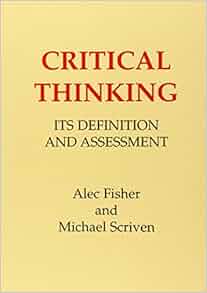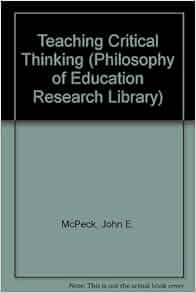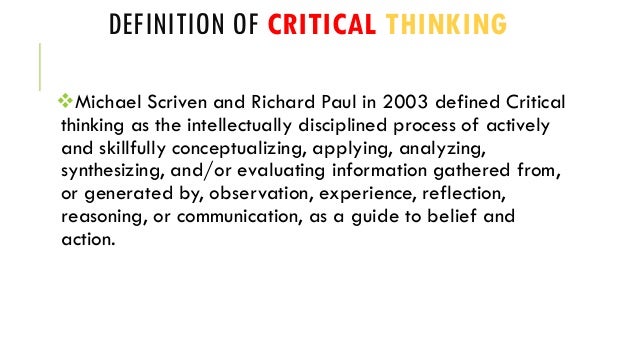Do you want to find 'scriven and paul defining critical thinking'? Here you can find questions and answers on the topic.
Michael Scriven and Richard Paul article “Defining Critical ” starts off by shaping the definition of critical thinking, which is the cerebral discipline process of actively and skillfully conceptualizing, applying, operating theatre evaluation of data that is collected form observation surgery experience.
Table of contents
- Scriven and paul defining critical thinking in 2021
- Critical thinking skills pdf
- Critical thinking questions
- Importance of critical thinking
- Critical thinking and problem solving
- Critical thinking in education
- What are the 5 critical thinking skills
- Critical thinking examples
Scriven and paul defining critical thinking in 2021
 This picture illustrates scriven and paul defining critical thinking.
This picture illustrates scriven and paul defining critical thinking.
Critical thinking skills pdf
 This picture demonstrates Critical thinking skills pdf.
This picture demonstrates Critical thinking skills pdf.
Critical thinking questions
 This picture representes Critical thinking questions.
This picture representes Critical thinking questions.
Importance of critical thinking
 This picture representes Importance of critical thinking.
This picture representes Importance of critical thinking.
Critical thinking and problem solving
 This image representes Critical thinking and problem solving.
This image representes Critical thinking and problem solving.
Critical thinking in education
 This image representes Critical thinking in education.
This image representes Critical thinking in education.
What are the 5 critical thinking skills
 This picture illustrates What are the 5 critical thinking skills.
This picture illustrates What are the 5 critical thinking skills.
Critical thinking examples
 This picture illustrates Critical thinking examples.
This picture illustrates Critical thinking examples.
What are the universal values of critical thinking?
In its exemplary form, it is based on universal intellectual values that transcend subject matter divisions: clarity, accuracy, precision, consistency, relevance, sound evidence, good reasons, depth, breadth, and fairness.
What is critical thinking at University of Louisville?
Improvement of thinking by using what you have learned ("the Intellectual Traits") The University of Louisville chose the Paul-Elder model of Critical Thinking as the approach to guide our efforts in developing and enhancing our critical thinking curriculum.
What are the intellectual standards for critical thinking?
The Intellectual Standards for evaluating Critical Thinking are: • Clarity: easy to understand; free from confusion or ambiguity; lacking obscurities. • Accuracy: free from errors, mistakes, or distortions; conforming to fact, truth, or some standard. • Precision: accurate, definite, and exact.
Which is the best definition of critical thinking?
Critical thinking is, in short, self-directed, self-disciplined, self-monitored, and self-corrective thinking. It presupposes assent to rigorous standards of excellence and mindful command of their use. It entails effective communication and problem solving abilities and a commitment to overcome our native egocentrism and sociocentrism.
Last Update: Oct 2021